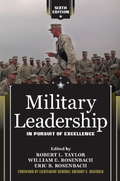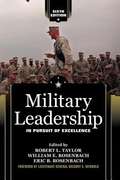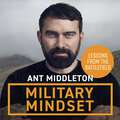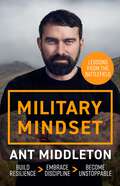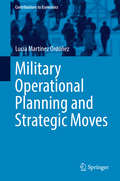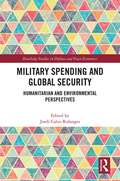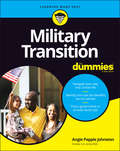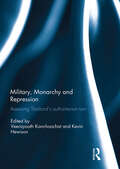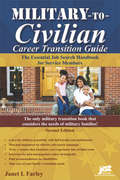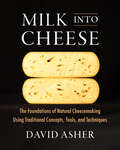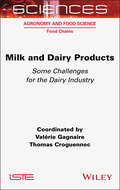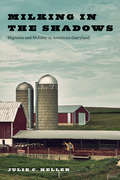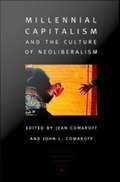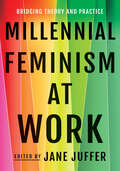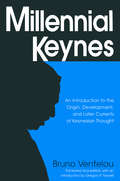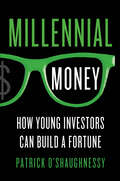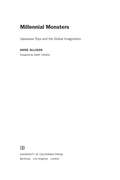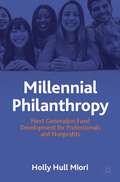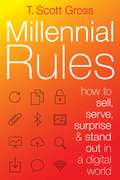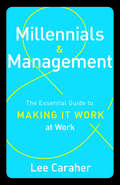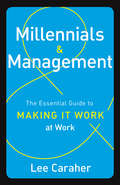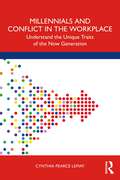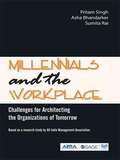- Table View
- List View
Military Leadership
by Taylor Robert L. Rosenbach William E.The sixth edition of this classic text continues its popular interdisciplinary approach to the topic of leadership by examining fundamental elements of military leadership: the "process" of leadership, the dynamic personal interactions between leader and followers, and the individual and organizational values that foster effective military leadership. Military Leadership provides a thoroughly reconsidered and greatly expanded mix of classic and contemporary articles as well as original essays, with authors representing all of the services. Incisive introductory essays to each section highlight themes and connections. Eric B. Rosenbach joins the editorial team for this edition, helping infuse the text with fresh perspectives. The essays of the sixth edition confront the kudos and criticisms that surround military leadership today, offer international viewpoints, and relate military leadership to contemporary leadership theory and approaches.
Military Leadership: In Pursuit of Excellence (6th Edition)
by Robert L. Taylor William E. Rosenbach Eric B. RosenbachThis 6th Edition examines fundamental elements of military leadership: the process of leadership, the dynamic personal interactions between leader and followers, and the values that foster effective leadership and provides a greatly expanded mix of classic and contemporary articles as well as original essays. The essays confront the criticisms that surround military leadership today, offer international viewpoints, and relate military leadership to contemporary leadership theory and approaches.
Military Mindset: THE EXPLOSIVE NEW BOOK FROM BESTSELLING AUTHOR ANT MIDDLETON
by Ant Middleton*Pre-order now: The explosive new book from the multiple Sunday Times bestselling author sharing unique insights gained from a life spent in the battlefield*'Few men are born brave; many become so through care and force of discipline.' Vegetius, De Re Militari, written in the 4th century AD. __________The warzone is the most unforgiving environment on the planet. A single mistake or split-second moment of indecision can mean the difference between success and failure, life and death. For Ant Middleton, first as a commando in the Royal Marines with 40 Commando and later as an elite operator with the SBS, the combat zone was a training ground like no other. Each mission provided valuable insights and teachings. In Military Mindset, Ant shares 52 lessons he learned during his military career that have helped him overcome challenges not only during combat, but also throughout his life. With the help of some historical battles, this book provides a framework for you to build an elite mindset and succeed your life and career. Throughout the book, you will learn:- How to set achievable goals - Why you need to push through the pain barrier- Strategies to eliminate self doubt - The importance of keeping things simple - Embracing a positive mindset - Focussing on the things you can control- And much more Written in a clear and direct way, this book provides simple and digestable wisdom to help you level up your life and discover your true potential. __________
Military Mindset: THE EXPLOSIVE NEW BOOK FROM BESTSELLING AUTHOR ANT MIDDLETON
by Ant Middleton*Pre-order now: The explosive new book from the multiple Sunday Times bestselling author sharing unique insights gained from a life spent in the battlefield*'Few men are born brave; many become so through care and force of discipline.' Vegetius, De Re Militari, written in the 4th century AD. __________The warzone is the most unforgiving environment on the planet. A single mistake or split-second moment of indecision can mean the difference between success and failure, life and death. For Ant Middleton, first as a commando in the Royal Marines with 40 Commando and later as an elite operator with the SBS, the combat zone was a training ground like no other. Each mission provided valuable insights and teachings. In Military Mindset, Ant shares 52 lessons he learned during his military career that have helped him overcome challenges not only during combat, but also throughout his life. With the help of some historical battles, this book provides a framework for you to build an elite mindset and succeed your life and career. Throughout the book, you will learn:- How to set achievable goals - Why you need to push through the pain barrier- Strategies to eliminate self doubt - The importance of keeping things simple - Embracing a positive mindset - Focussing on the things you can control- And much more Written in a clear and direct way, this book provides simple and digestable wisdom to help you level up your life and discover your true potential. __________
Military Operational Planning and Strategic Moves
by Lucía Martínez OrdóñezThis book employs game theory to warfare and in particular to military operations. It aims at scrutinizing the validity of the two ideas that have governed the literature on war and warfighting: One is the Clausewitzian Fog of War, which suggests that he who is able to "see" through the gunsmoke and observe his opponent’s moves before he has to commit to some strategy himself, should be able to gain an advantage over that enemy; the other is the tradition of understanding military conflict as a zero-sum game. Combined, these ideas seem to imply that war always gives rise to a second-mover advantage. This book questions the validity of this presumption at the operational level of military planning. It provides a simple but rigorous game-theoretic framework in order to analyse operational alternatives for a whole range of typical conflicts Western military forces are facing, including the most recent ones such as Anti-Access/Area-Denial and supporting host nations' counterinsurgency campaigns.
Military Spending and Global Security: Humanitarian and Environmental Perspectives (Routledge Studies in Defence and Peace Economics)
by Jordi Calvo RufangesGlobal military expenditure reached an estimated $1,822 billion in 2018 and this book questions what that spending responds to and indeed what that entails in terms of global security. The book draws from prior knowledge and research on military expenditure but introduces an all-encompassing, in-depth and original analysis of military spending as a key and often overlooked factor of global instability, delving into the present and future consequences of its perpetual growth, as well as, confronting the reasoning behind it. The authors argue that increasing military expenditure is not the best response to the emergencies militarization itself has helped create. They assert that militarization is paradoxically both a cause of and a response to the grave challenges our society is facing. The book explains why people are not well served by nation-states when they continuously seek to out-compete one another in the size and destructive powers of their militaries. It discusses the scope of military spending around the world, while explaining how militarism is linked with conflict and security threats, and how military spending further prevents us from adequately dealing with global environmental problems like climate change. A must-read for scholars, researchers and students from a wide range of disciplines. It will also find an audience among professionals from the third sector and activists working on issues related to peace, security and militarism, but also social and climate justice.
Military Transition For Dummies
by Angie Papple JohnstonConquer civilian life after the serviceYou’ve served your country proudly. Now it’s time to discover all the things your country can do for you! In Military Transition For Dummies, you’ll learn how to tackle civilian life from a tactical standpoint, head on and full bore. Find out how to set yourself up for success before you leave the service and what to do when you land in the civilian world. Whether your sights are set on re-entering the workforce or you’re aiming to go back to school, this book walks you through each step of the way.Inside…Prepare for your separationFind your place as a civilianAccess veteran resourcesPerfect your resumeConquer job interviewsFind a great job or schoolManage your money wiselyGet the support you need
Military, Monarchy and Repression: Assessing Thailand's Authoritarian Turn
by Veerayooth Kanchoochat Kevin HewisonThailand’s politics has been contentious in recent years. With a military coup in 2006 and another in 2014, the country has moved from being a promising electoral democracy to a military dictatorship. Electoral politics was embraced enthusiastically by some groups, including those in rural areas of the north and northeast, but came to be feared by groups variously identified as the old elite, royalists and the establishment. The transition to authoritarianism saw large and lengthy street protests and considerable violence. This book examines the background to and the sources of conflict and the turn to authoritarianism. It addresses: the return of the military to political centre stage; the monarchy’s pivotal role in opposing electoral democracy; the manner in which sections of civil society have rejected electoral politics; and the rise of powerful non-elected bodies such as the Constitutional Court.
Military-to-Civilian Career Transition Guide: The Essential Job Search Handbook for Service Members (Second Edition)
by Janet I. FarleyThis handbook provides a career transition framework for service members and their families. Readers are given exit strategies for gracefully leaving the military; charts, checklists, and worksheets for planning each transition aspect; resume and cover letter samples and strategies; and interviewing and salary negotiation tips.
Milk Baths and Charm Necklaces: Had Randy Weiner (Finally) Gone Too Far?
by Mukti Khaire Hannah CatzenThe case on Randy Weiner explores the tensions between artistic and financial imperatives in a for-profit immersive theater venture. In order to revive the dormant Manhattan nightclub "The Diamond Horseshoe," theater-impresario Randy Weiner created "The Queen of the Night," a hybrid performance that combines food, opera, circus arts, and dance. While "The Queen of the Night" is the latest in a string of productions categorized as "immersive theater," a category Weiner is credited with inventing, it is also more expensive and more artistically risky than anything he has ever done before. Has Weiner finally gone too far, or will he be able to pull this off? This case explores the creation of a market for immersive theater, as well as structures Weiner has created to fund, manage, and create his productions. Additionally, this case examines the psyche of Weiner, a successful artist-entrepreneur, and investigates the role of risk, controversy, and the line between avant-garde and controversial art in creating works that are both financially profitable and artistically impactful.
Milk Into Cheese: The Foundations of Natural Cheesemaking Using Traditional Concepts, Tools, and Techniques
by David AsherLonglisted for the André Simon Award for Food Books for 2024&“Essential reading for anyone wanting to learn all they can about the ways in which humans, and our domesticates, share this world with microbes.&”—David Zilber, chef and food scientist; coauthor of The Noma Guide to FermentationWith recipes for over 80 natural cheeses and complimentary ferments, this groundbreaking, comprehensive book guarantees high-quality results and perfect flavors for every season.Cheese is milk&’s destiny. In Milk Into Cheese, cheesemakers at every scale will learn to produce a broad range of traditional cheeses, entirely naturally. Experienced educator, activist, and celebrated natural cheesemaker David Asher introduces the reader to the cultures and practices of cheesemakers, the role our agricultural practices play in making cheese, the biological evolution of cheese, and the transformation of milk into cheese through fermentation.A perfect companion to David&’s The Art of Natural Cheesemaking, Milk Into Cheese expands the cheesemaker&’s tool kit through an exploration of cheesemaking styles from around the world. These natural cheesemaking processes are made simple, in contrast to the complicated, controversial, and confusing world of industrial cheesemaking, with its reliance on freeze-dried cultures, chemical additives, and ever-expanding use of expensive technology.Milk Into Cheese also celebrates the world&’s most delicious seasonal hand-made cheeses, including alpine, blue, and milled cheeses. Through gorgeous photography and detailed recipes, David prepares the reader for their own journey into traditional natural cheesemaking. He also shares simple recipes for fermented foods that complement and help us understand cheesemaking better, including pickles, sourdough bread, butter, and salami.For home, small-scale, and larger-scale cheesemakers, Milk Into Cheese delivers a sophisticated look at the biological science that informs—and the ecological principles that guide—natural cheesemaking.&“An inspired how-to guide for the greatest of culinary transformations.&”—Dan Barber, chef, Blue Hill&“In detail and with great passion [Asher explains] the hows and whys of making cheese in traditional and simple ways, based on extensive and broad experience with the incredibly varied ways in which people have, do, and can work with milk.&”—Sandor Ellix Katz, fermentation revivalist; author of The Art of Fermentation and other fermentation bestsellers
Milk and Dairy Products: Some Challenges for the Dairy Industry (ISTE Consignment)
by Thomas Croguennec Valérie GagnaireMilk is considered a complete food, consumed at all stages of life. It is transformed into numerous products, fermented or not, as well as into a variety of ingredients, in order to preserve it or some of its constituents from a few days to a few years. This book addresses the innovations that deal with milk and the use of gentle techniques that best preserve dairy constituents. This book explores some of the current challenges facing the milk processing industry, namely: i) showing the advances in infant milk formula to best mimic breastfeeding and the in vitro models that study newborn digestion, ii) combining tradition and new consumer expectations on emblematic dairy products, such as yogurt and fermented milk products, iii) defining optimal cheese-making practices to control both cheese quality and yield, iv) outlining the current research approaches to meet “consum’actor” demands, as well as those dealing with v) the fouling and cleaning of dairy equipment in a context of increasingly constrained water and energy use.
Milking in the Shadows: Migrants and Mobility in America’s Dairyland (Inequality at Work: Perspectives on Race, Gender, Class, and Labor)
by Julie C. KellerMigrant workers live in a transnational world that spans the boundaries of nation-states. Yet for undocumented workers, this world is complicated by inflexible immigration policies and the ever-present threat of enforcement. Workers labeled as “illegals” wrestle with restrictive immigration policies, evading border patrol and local police as they risk their lives to achieve economic stability for their families. For this group of workers, whose lives in the U.S. are largely defined by their tenuous legal status, the sacrifices they make to get ahead entail long periods of waiting, extended separation from family, and above all, tremendous uncertainty around a freedom that many of us take for granted—everyday mobility. In Milking in the Shadows, Julie Keller takes an in-depth look at a population of undocumented migrants working in the American dairy industry to understand the components of this labor system. This book offers a framework for understanding the disjuncture between the labor desired by employers and life as an undocumented worker in America today.
Millegan Creek Apartments
by William J. Poorvu John H. Vogel Jr.Fleet Bank is considering a construction loan for a 390-unit apartment project in Austin, Texas. The case describes the location, market, product, and other real estate factors the bank needs to consider in making this loan. Also discusses the financial and construction risks involved in structuring this kind of credit facility.
Millennial Capitalism and the Culture of Neoliberalism
by Dilip Parameshwar GaonkarThe essays in Millennial Capitalism and the Culture of Neoliberalism pose a series of related questions: How are we to understand capitalism at the millennium? Is it a singular or polythetic creature? What are we to make of the culture of neoliberalism that appears to accompany it, taking on simultaneously local and translocal forms? To what extent does it make sense to describe the present juncture in world history as an "age of revolution," one not unlike 1789-1848 in its transformative potential? In exploring the material and cultural dimensions of the Age of Millennial Capitalism, the contributors interrogate the so-called crisis of the nation-state, how the triumph of the free market obscures rising tides of violence and cultures of exclusion, and the growth of new forms of identity politics. The collection also investigates the tendency of neoliberal capitalism to produce a world of increasing differences in wealth, environmental catastrophes, heightened flows of people and value across space and time, moral panics and social impossibilities, bitter generational antagonisms and gender conflicts, invisible class distinction, and "pariah" forms of economic activity. In the process, the volume opens up an empirically grounded, conceptual discussion about the world-at-large at a particularly momentous historical time--when the social sciences and humanities are in danger of ceding intellectual initiative to the masters of the market and the media. In addition to its crossdisciplinary essays, Millennial Capitalism and the Culture of Neoliberalism--originally the third installment of the journal Public Culture's "Millennial Quartet"--features several photographic essays. The book will interest anthropologists, political geographers, economists, sociologists, and political theorists. Contributors. Scott Bradwell, Jean Comaroff, John L. Comaroff, Fernando Coronil, Peter Geschiere, David Harvey, Luiz Paulo Lima, Caitrin Lynch, Rosalind C. Morris, David G. Nicholls, Francis Nyamnjoh, Elizabeth A. Povinelli, Paul Ryer, Allan Sekula, Irene Stengs, Michael Storper, Seamus Walsh, Robert P. Weller, Hylton White, Melissa W. Wright, Jeffrey A. Zimmerman
Millennial Feminism at Work: Bridging Theory and Practice
by Jane JufferIn Millennial Feminism at Work, volume editor Jane Juffer brings together recently graduated students from across the US to reflect on the relevance of their feminist studies programs in their chosen career paths. The result is a dynamic collection of voices, shaking up preconceived ideas and showing the positive influence of gender and sexuality studies on individuals at work.Encompassing five areas—corporate, education, nonprofit, medical, and media careers—these engaging essays use personal experiences to analyze the pressure on young adults to define themselves through creative work, even when that job may not sustain them financially. Obstacles to feminist work conditions notwithstanding, they urge readers to never downplay their feminist credentials and prove that gender and sexuality studies degrees can serve graduates well in the current marketplace and prepare them for life outside of their alma mater. Emphasizing the importance of individual stories situated within political and economic structures, Millennial Feminism at Work provides spirited collective advice and a unique window into the lives and careers of young feminists sharing the lessons they have learned.Contributors: Rose Al Abosy, Rachel Cromidas, Lauren Danzig, Sadaf Ferdowsi, Reina Gattuso, Jael Goldfine, Sassafras Lowrey, Alissa Medina, Samuel Naimi, Stephanie Newman, Justine Parkin, Lily Pierce, Kate Poor, Laura Ramos-Jaimes, Savannah Taylor, Addie Tsai, Hayley Zablotsky
Millennial Keynes: The Origins, Development and Future of Keynesian Economics
by Bruno Ventelou Gregory P. NowellBoth a grounding in the origins and development of Keynesian economics, this study also looks at the ongoing significance of his work. It examines the different interpretations of Keynsian thought on economics as a discipline and the schools of thought that provided these interpretations.
Millennial Money: How Young Investors Can Build a Fortune
by Patrick O'ShaughnessyFact: the Millennial Generation will not be able to rely on pensions and social security in retirement. Instead, they will have to save and invest in the global stock market to meet their goals. When it comes to thinking about money, Millennials are, as a generation, different from their parents. They are skeptical of expert advice, yet more committed than baby boomers to passing wealth on to future generations. To build wealth, young people must start investing early and buck conventional market wisdom. Millennial Money will explain the most common mistakes that hurt investors' long-term returns and show why their investments in popular stocks or the hottest industry of the day have resulted in such underwhelming results. More importantly, the book will introduce a strategy that can help us overcome our shortcomings as investors. Armed with this strategy, Millennials can become the most successful investing generation in history.
Millennial Monsters: Japanese Toys and the Global Imagination
by Anne Allison Gary CrossFrom sushi and karaoke to martial arts and technoware, the currency of made-in-Japan cultural goods has skyrocketed in the global marketplace during the past decade. The globalization of Japanese "cool" is led by youth products: video games, manga (comic books), anime (animation), and cute characters that have fostered kid crazes from Hong Kong to Canada. Examining the crossover traffic between Japan and the United States, Millennial Monsters explores the global popularity of Japanese youth goods today while it questions the make-up of the fantasies and the capitalistic conditions of the play involved. Arguing that part of the appeal of such dream worlds is the polymorphous perversity with which they scramble identity and character, the author traces the postindustrial milieux from which such fantasies have arisen in postwar Japan and been popularly received in the United States.
Millennial Philanthropy: Next Generation Fund Development for Professionals and Nonprofits
by Holly Hull MioriNearly 75 million people make up the Millennial generation in the United States, and yet, for many nonprofits, this generation remains an untapped resource. The most significant transfer of wealth known as the Great Transfer of Wealth is shifting from older generations to the Millennials and younger ones. This transfer has prompted nonprofits to navigate new realities caused by the pandemic and other social issues. Nonprofits should consider Millennials as a valuable source of people, power, and philanthropic support. Dr. Holly Hull Miori, an academic, researcher, and fundraising professional, has developed a comprehensive guide that explores the potential roles that Millennials can and should assume in nonprofits, including those of donors, board members, and volunteers. Her guide is designed to engage both academic and nonprofit/fundraising audiences, offering insights and actionable strategies for unlocking the potential of this emerging group. The book presents six distinct findings, providing innovative ideas that nonprofits and fundraisers can implement to engage the Millennial generation effectively. It features a combination of case studies and a roadmap to help readers gain practical insights into engaging this demographic group.
Millennial Rules: How to Connect with the First Digitally Savvy Generation of Consumers and Employees
by T. Scott GrossIn today's digital world, the Baby Boomers and Generation X are giving way to a new generation of consumers: the Millennials. These tech-savvy consumers-bearing the mantra "my way, right way, why pay?"-want quick, customizable service that is negotiated on their terms and delivers great value. And when Millennials want help, they want it now; when they don't want help, they expect the sales staff to be invisible.In Millennial Rules: How to Sell, Serve, Surprise, and Stand Out in a Digital World, veteran business owner T. Scott Gross demystifies the newest generation and shares how businesses can meet and exceed Millennials' expectations to make the sale-without resorting to tricks and gimmicks. Invisible selling is built on ethical, common-sense business practices that yield success across the board, regardless of niche or industry. Armed with research into generational consumer preferences, humor, and a wealth of experience, Gross tackles the looming question, "How can you disappear and still deliver quality service?" The answer, he suggests, is by emphasizing serving above selling, a strategy that will make organizations successful not just with Millennials, but with all generations.For better or for worse, the Millennials aren't going anywhere. By learning what has changed-and what hasn't-you can cater to the wants and needs of each generation and still come out on top. Millennial Rules reveals the ins and outs of Millennials not only as customers but as employees, demonstrating what lifestyle demands to watch out for and why Millennials might be a valuable addition to your team.Rather than proposing a total revolution in business, Gross reinforces a pattern of success by making readers aware of what they're already doing right-and how to do more of it.
Millennials & Management: The Essential Guide to Making it Work at Work
by Lee CaraherAs management ages and prepares to work longer than previous generations and Millennials join companies at a steady rate, companies are faced with the truth: they can't just wait for management to age out to fix the dissonance and tension between Boomers and Millennials in the workplace. Finding productive ways to work across the generation gap is essential, and the organizations that do this well will have significant strategic advantages over those that don't. Millennials & Management: The Essential Guide to Making It Work at Work addresses a very real concern of large and small businesses nationwide: how to motivate, collaborate with, and manage the millennial generation--who now make up almost 50% of the American workforce. The key is to change our attitude from one of disbelief and derision to acceptance and respect without giving up our work standards. Using real-world examples, author Lee Caraher gives leaders data-driven steps to take to co-create a productive workplace for today and tomorrow.
Millennials & Management: The Essential Guide to Making it Work at Work
by Lee CaraherAs management ages and prepares to work longer than previous generations and Millennials join companies at steady rate, companies are suffering through tension and dissonance between Millennials and Boomers, and realizing that they can't just wait for management to age out to fix it. Finding productive ways to work across the generation gap is essential, and the organizations that do this well will have significant strategic advantages over those that don't. Millennials & Management: The Essential Guide to Making It Work at Work addresses a very real concern of large and small businesses nationwide: how to motivate, collaborate with, and manage the millennial generation, who now make up almost 50% of the American workforce. The key is to change Boomer attitudes from disbelief and derision to acceptance and respect without giving up work standards. Using real world examples, author Lee Caraher gives leaders data-driven steps to take to co-create a productive workplace for today and tomorrow.
Millennials and Conflict in the Workplace: Understand the Unique Traits of the Now Generation
by Cynthia Pearce LeMayThis book unravels the mysteries and confusion surrounding Millennials. They are now the largest group in the labor force and their presence redefines the workplace for many organizations. Many older workers, who struggle to understand Millennials, often define them by stereotypes rather than their actual attributes. The historical and social events that occurred when Millennials were growing up are reviewed, which can result in traits and values specific to this cohort. The research behind this book explores the conflict styles of Millennials compared to Generation Xers and Baby Boomers – the unique strategies they are likely to use to address conflict in the workplace. This book shares the results of interviews and focus groups providing first-hand accounts from Millennials and non-Millennials about their work interactions. And the results from approximately 11,000 test-takers of the Thomas-Kilmann Conflict Mode Instrument provide fascinating findings about generational differences in conflict styles. Millennials grew up with technology at their fingertips and tend to avoid conflict and seek advice from their online support groups. The book will also dig into Millennials’ powerful use of social media and how they use it to further their causes. They have a strong desire to know what’s happening now and find it difficult to “turn off.” This book explores generational differences and finds an increase in unassertive styles in Millennial males. This work shares what Millennials want and value in a workplace and what employers can do to recruit and retain this valuable cohort. Millennials’ diversity, political and social engagement, and the implications for the broader society are explored. This research fills an important gap in the research on generational cohorts and conflict management and provides valuable information to scholars and practitioners alike.
Millennials and the Workplace
by Pritam Singh Sumita Rai Asha BhandarkerMillennials and the Workplace explores the rapidly changing workplace environment and its meaning in the new millennium. It takes a look at the young generation-the Millennials-who do not accept the 'status quo', who have moved from obedience to questioning, and who assess work in terms of its significance in human life and human nature. The book studies the Millennials and profiles them according to their demographic and psychographic background along with personality factors such as work locus of control, personal values and achievement motivation, and so on. The authors highlight the gap between what the Millennials expect and what they get at the workplace. The contours of the new workplace-creating alignment between the individual's expectations and the organization's offering-have been sketched in detail for retaining talent. With these insights, the book will be immensely useful to all corporate professionals, academia, and students.
